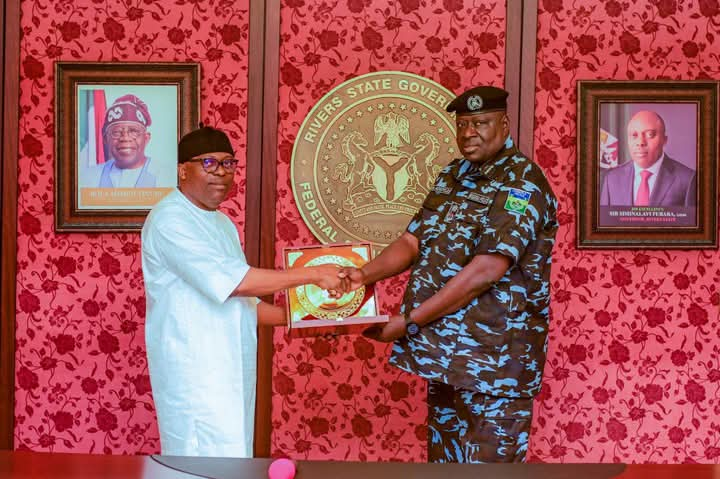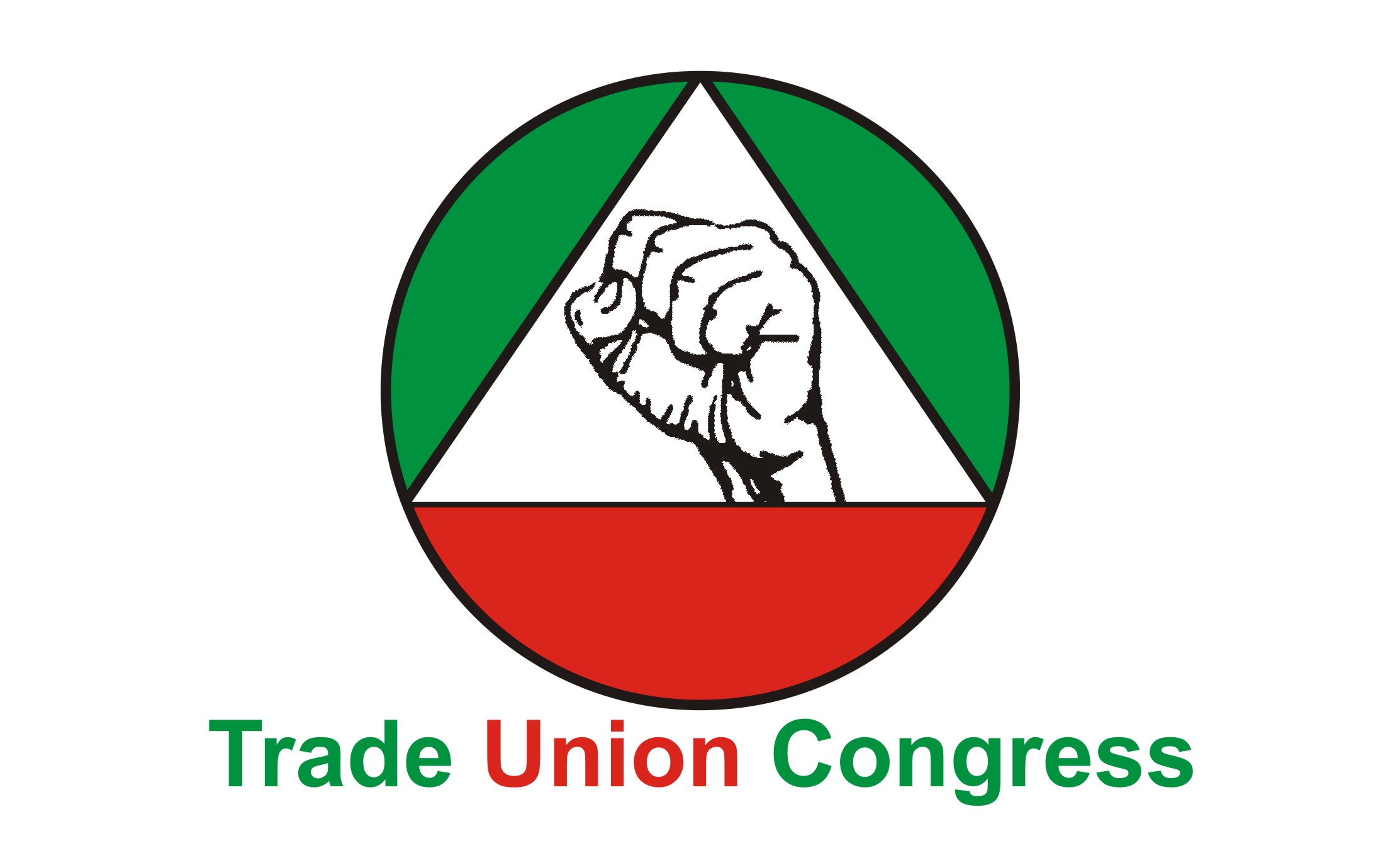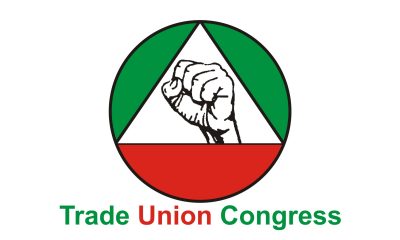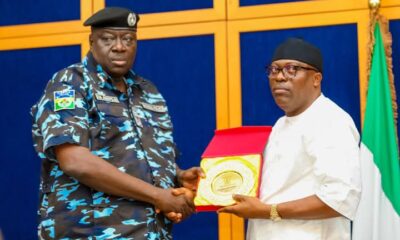News
Nigerian Army Nabs Five Fake Soldiers In Lagos
Five persons who have been masquerading as soldiers have been arrested by 9 Brigade of the Nigerian Army, Ikeja Cantonment, Lagos.
The suspects who were handed over to the Police for further investigation and prosecution, on Saturday, were reportedly apprehended on separate locations at Ojodu Berger, Ikorodu, Ogba, and Ikeja areas of Lagos State.
The suspects, identified as Johnson Ayemoba, Salami Olamilekan, Mumammed Bilyaminu, Abijo Taofeek and Adewale Quadri, according to the Director of Public Relations for the 9 Brigade, Major Augustine Kolawole, were captured during a routine patrol conducted by the Brigade.
One of the impersonators, 32-year-old Johnson Ayemoba, was found dressed in full military camouflage, with a photograph of himself wearing the military uniform.
During interrogation, Ayemoba claimed that a friend gave him the uniform.
He said, “I work as a bouncer and provide security at event places like Ikeja, Lekki, and Victoria Island. I obtained the uniform from my friend, Tiger. My arrest occurred in Ikeja while I was not wearing the uniform but in civilian attire. I took this picture during my birthday.”
For Olamilekan, he explained that he wore it to escort vehicles within and outside Lagos, adding that he acquired the uniform from a man he gave his name simply as Tiger, who was introduced to him by the first suspect.
While briefing journalists on the arrest, Major Kolawole, said “These impostors had been presenting themselves as soldiers of the Nigerian Army, causing disturbances, engaging in theft through deception, and at times, resorting to violence while using military uniforms and equipment. These actions, along with those of other impostors still at large, have severely tarnished the reputation of the Nigerian Army among law-abiding citizens.
“For the record, Headquarters 9 Brigade Nigerian Army under the command of Brigadier General Adegoke Adetuyi will continue to ensure that troops deployed on Internal Security duties operate professionally within the purview of the law. This Headquarters will continue to uphold the Nigerian Army Code of Conduct, ethics, core values, and soldiers’ creed, hence, it will never encourage or tolerate the engagement of troops in any act that will hurt law-abiding citizens they are meant to protect.
“We, therefore, appeal to law-abiding citizens to be wary of such impostors parading themselves as soldiers and mounting illegal roadblocks in some parts of Lagos State.
“We also request Lagosians to report any suspicious act by unauthorized men in military uniforms to the appropriate authority in order not to fall victim to their dastardly acts”.
Major Kolawole expressed optimism that the Police investigation and subsequent prosecution would send a strong warning to other criminals within the 9 Brigade’s Area of responsibility and the nation as a whole.
He further warned members of the public to desist from the use of Army stickers, placement of camouflage jungle hats on vehicle dashboards, and the display of other military insignia or accouterments on private vehicles, “as well as wearing military uniforms for fashion purposes. They are illegal. Anyone caught engaging in these violations may face prosecution for impersonation.”
Recall that the Lagos State Police Command recently arrested and paraded impostors in military uniforms who confessed to being responsible for the murder of an aide to Senator Adela Yayi representing Ogun State, Adeniji Sanni, last month.
News
Don’t Attend Nocturnal Meetings To Declare War On Rivers, Fubara Tells New CP

Rivers State Governor, Sir Siminalayi Fubara, has advised the new Commissioner of Police posted to the State, Olugbenga Adepoju, to resist the temptation of attending nocturnal meetings that will make him declare war on Rivers people.
Rather, the Governor urged him to put the general interest of the people of the State above other considerations so that he can work to ensure that peace prevailed and there is stability.
Governor Fubara gave the advice when he received CP Olugbenga Adepoju, the 47th Commissioner of Police, Rivers State Command, on courtesy visit, at Government House in Port Harcourt, last Friday.
The Governor said: “You are not a new person in our State. You’ve been here, more especially, in charge of Operations. It then means if I start to talk about my story, it’ll connect with your activities in Operations. But I am not going to talk about my story.
“But the good thing here is, you said something that I want to really anchor on. Your duty, as it stands now, is to work with the government, work with other sister agencies to maintain law and order, protect lives and property of the people of Rivers State.
“Be apolitical, as you just read in your address. Don’t go to nocturnal meetings in people’s houses, and in the morning, you come and declare war on Rivers people. That is the only advice I will give to you.”
Governor Fubara charged the CP, who is already conversant with the Rivers State terrain and its associated security challenges, to draw up a holistic plan on how to tackle the twin problem of cultism among the youths and kidnapping incidences in boundary communities.
Governor Fubara said his administration is not failing on its responsibilities to security agencies to sufficiently address those issues and save Rivers people, adding, “But the primary duty of this team, these particular challenges are rested on the police. So, please, take this one as my own assignment (to you).
“While you are carrying out the larger assignment that your people from headquarters will send you, also make sure that you look for every way possible to reduce issues of cultism because it is affecting our secondary schools, it is affecting our primary schools with students growing to become monsters, which is also leading to other issues like kidnapping and others.
“It starts from somewhere. So, we must also get to the root and reduce it. I know we cannot totally eliminate it, but, somehow, let us look for a way to reduce it.”
Governor Fubara said the former CP to the State had succeeded because he maintained healthy synergy with the State Government, and assured that the same level of support will be provided to the new CP, if he adheres to the tenets of professionalism, stressing, “On our part as a Government, we will continue to support you to make sure you succeed. Your success here will mean more elevation for you. If you have a very bad record here, whether you like it or not, it will one day in the course of your profession, affect your growth.”
In his address, Rivers State Commissioner of Police, CP Olugbenga Adepoju, expressed profound gratitude for the opportunity given to him to serve the resilient and vibrant people of Rivers State as the 47th Commissioner of Police.
CP Adepoju said he is fully aware of the complex security challenges in the State, and is determined to do everything professionally to confront them with innovation.
He said, “We will strengthen our intelligence gathering capabilities, enhance our rapid response mechanism, and most importantly, foster deeper trust and collaboration with the community we serve. Our Command will remain firmly apolitical, standing as a neutral and impartial institution, dedicated solely to upholding law and order. This commitment is vital to maintaining the trust and confidence of the people we protect.”
CP Adepoju also said: “While we will engage constructively with political leaders and key stakeholders to secure necessary resources and support, our engagement will always be conducted with professionalism and integrity”.
Meanwhile, Governor Siminalayi Fubara, and the State Commissioner of Police, Olugbenga Adepoju, have decorated two officers in Government House with their new ranks of Deputy Superintendent of Police (DSP).
They include the Personal Security Officer to the Governor, Anthony Peter, who was recently promoted from Assistant Superintendent of Police (ASP 1) to Deputy Superintendent of Police (DSP); and Provost Marshal, Government House, John Wakama, who was also promoted from Assistant Superintendent of Police (ASP 1) to Deputy Superintendent of Police (DSP).
Both the Governor and the Commissioner of Police were assisted at the short event by the wives of the newly promoted officers.
The decoration ceremony was performed shortly after the courtesy visit to the Governor by the State Commissioner of Police at the Government House, Port Harcourt, last Friday.
News
TUC Rejects VAT Hike, Urges Pro-people Tax Reforms

The Trade Union Congress of Nigeria has opposed the proposed increase in the Value Added Tax rate, as outlined in the Federal Government’s Tax Reform Bills, warning that the move could worsen the economic hardship faced by Nigerians.
The Federal Government had proposed a phased VAT hike from the current 7.5% to 10%, 12.5%, and ultimately 15%, a move the TUC described as ill-timed and detrimental to the welfare of citizens already grappling with inflation, unemployment, and a soaring cost of living.
Speaking during a press briefing in Abuja, yesterday, following the union’s National Executive Council meeting held on November 26, 2024, TUC President Festus Osifo said maintaining the VAT rate at 7.5 per cent was crucial to safeguarding Nigerians from additional financial pressure.
“Allowing the Value Added Tax rate to remain at 7.5 per cent is in the best interest of the nation. Increasing it now would impose an additional burden on households and businesses already struggling with economic challenges,” Osifo said.
He added, “With inflation, unemployment, and the cost of living on the rise, higher taxes could stifle economic growth and erode consumer purchasing power.”
The TUC called for a review of the tax exemption threshold, urging the government to raise it from N800,000 to N2.5 million per annum to ease the financial strain on low-income earners.
“This measure would increase disposable income, stimulate economic activity, and provide relief to struggling Nigerians,” Osifo explained.
He said, “The threshold for tax exemptions should be increased to N2,500,000 per annum. This adjustment would offer much-needed relief to low-income earners, enabling them to cope with the current economic challenges.”
The TUC also expressed reservations about the proposed transfer of royalty collection from the Nigerian Upstream Petroleum Regulatory Commission to the Nigeria Revenue Service (NRS), citing risks of revenue losses and inefficiencies.
“Royalty determination and reconciliation require specialised technical expertise in oil and gas operations, which the NUPRC possesses but the NRS lacks. This shift could result in inaccurate assessments, enforcement challenges, and reduced investor confidence,” Osifo warned.
The union commended the government’s decision to retain the Tertiary Education Trust Fund and the National Agency for Science and Engineering Infrastructure, describing their roles as pivotal to the country’s education and technological advancement.
“These institutions have significantly contributed to improving tertiary education and fostering homegrown technologies. Their continued existence is vital for sustained progress in education, technology, and national development,” Osifo said.
Osifo called on the Federal Government to adopt tax policies that prioritise the welfare of citizens and promote equitable economic growth.
“As discussions on the Tax Reform Bill continue, it is our hope that the focus will remain on fostering economic growth and improving living conditions for all Nigerians,” he said.
The TUC reaffirmed its commitment to advocating for policies that enhance the well-being of Nigerians, emphasising that proactive and citizen-centred reforms reflect true leadership.
News
Fubara Inaugurates Road Project To Celebrate Jackrich On Birthday

Rivers State Governor, Sir Siminalayi Fubara, has noted with delight the initiative, love and courage shown by High Chief Sobomabo Jackrich in contributing to improved road infrastructure in his community.
Governor Fubara made the commendation when he visited the country home of Amb Sobomabo Jackrich to celebrate with him on his birthday, and used the occasion to inaugurate a road project executed by the celebrant in Usokun Town in Degema Local Government Area.
Amb Sobomabo Jackrich, also known as Egberepapa, is a prominent Niger Delta leader and National Chairman of Simplicity Movement.
Governor Fubara said the road project, solely funded and completed by the celebrant, shows how committed he is to making life better for residents in his community.
The Governor said: “Let me on behalf of the guests that are here to celebrate with our brother, not really an official engagement, but on a personal note, also share a wonderful moment with our people.
“Our celebrant is not just celebrating his birthday, but he is also giving back to the society. So, I join him and all well-meaning people that believe in his course to commission this project that he has embarked on in his own accord for the betterment of his people.
“I want to say that with what I am seeing here, there may be a few things that we can also do to make this project more meaningful to the people in terms of streetlights. On our own, we are going to support him to complete it.”
Governor Fubara, who also joined the celebrant to cut the birthday cake, prayed for strength and longevity for the celebrant.
-

 News17 hours ago
News17 hours agoFubara Inaugurates Road Project To Celebrate Jackrich On Birthday
-

 Featured17 hours ago
Featured17 hours agoNigeria, S/Arabia, Deepen Ties On Solid Mineral Exploration
-
Niger Delta17 hours ago
RSBOPP Moves To Review Procurement Processes
-

 News17 hours ago
News17 hours agoTUC Rejects VAT Hike, Urges Pro-people Tax Reforms
-

 Business17 hours ago
Business17 hours agoCBN Predicts 4.17% GDP Growth In 2025
-
Rivers16 hours ago
100 Days: Omuma Council Boss Lists Achievements
-

 Featured16 hours ago
Featured16 hours agoTinubu Pledges Peace, Justice, Development in Ogoniland….Fubara Lauds President on Peace Talks
-

 Featured19 hours ago
Featured19 hours agoFG, States, Local Govts Share N1.42trn In January

